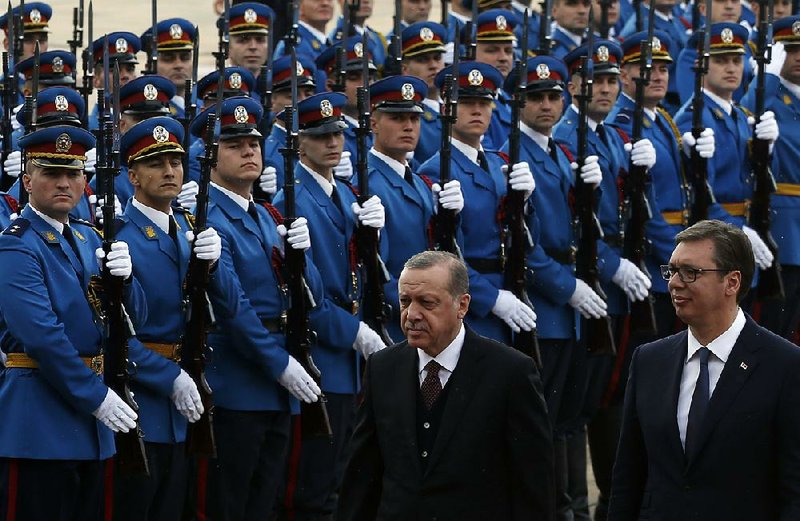BELGRADE, Serbia -- Turkish President Recep Tayyip Erdogan said the U.S. should immediately withdraw its ambassador if he failed to consult with his superiors over a decision to suspend visa services, adding he doesn't regard the envoy as an American representative and won't accept his farewell visit.
"I find the lack of consultation by senior U.S. authorities with our foreign minister awkward," Erdogan said in televised remarks in Belgrade, Serbia. "If the ambassador acted on his own, then the U.S. administration should not keep him there for a minute."
While the White House and State Department stayed silent over the latest crisis to roil ties between the NATO allies, U.S. Ambassador John Bass issued an unusual video statement late Monday on YouTube saying he hasn't been told why a Turkish employee working for the U.S. was arrested last week, the second such detention this year.
The embassy stopped issuing nonimmigrant visas in Turkey, a NATO ally and key trading partner, in a move that sent markets falling and prompted a retaliatory response by Turkish authorities. Bass has been tapped by President Donald Trump as the next U.S. ambassador to Afghanistan.
By pinning the blame on the ambassador, Erdogan could be trying to find a way out of the crisis while saving face, said Timothy Ash, senior emerging-markets sovereign strategist at Bluebay Asset Management in London. And Trump may be willing to "throw Bass under the bus for the sake of U.S.-Turkish relations," Ash said.
Erdogan also rebuffed criticism of Turkey's arrest of the consulate employee, alleging that the employee had ties to U.S.-based cleric Fethullah Gulen, whom Turkey accuses of masterminding last year's coup attempt.
"The information that a second person is there shows something is going on at the consulate in Istanbul," the president said, adding that the U.S. should evaluate how these "agents" infiltrated the mission or who placed them there.
Prime Minister Binali Yildirim earlier said Turkey didn't need the consent of U.S. authorities to prosecute its own citizens working at American diplomatic posts in the country.
"Turkey is a state ruled by law," Yildirim told lawmakers of his governing Justice and Development Party in parliament on Tuesday. "Does working at an American mission bring any immunity to anyone accused of committing a crime?"
Channels of communication were available to help solve the impasse, Yildirim said.
Turkey's ties with the U.S. have frayed after a failed coup against Erdogan in July 2016. The U.S. has refused to extradite Gulen, citing a lack of evidence. In the purge that followed the coup attempt, about 110,000 alleged supporters of Gulen have been removed from state jobs; banks, businesses and media outlets have been seized or shut down; and tens of thousands of people, including army officers, academics and journalists, remain in detention.
The two countries have also feuded over U.S. support for Kurdish fighters in Syria, which Ankara says are aligned with an outlawed group at home.
Yildirim touched on both grievances in his address in Ankara.
Bass' video statement -- and the lack of comment from Washington -- was the latest twist in a relationship that seemed poised for an upgrade when Trump took office in January, after deteriorating ties during President Barack Obama's administration. As recently as last month at the United Nations, Trump said Erdogan was "becoming a friend of mine" and that "frankly, he's getting high marks."
But in recent months, Erdogan has increased coordination with Russia and Iran. Turkey recently agreed to buy a Russian missile-defense system that isn't compatible with the arsenals of its NATO partners.
Even if "this spat is now resolved quickly, I think it has exposed the deep-seated problems in Turkish relations with the West," Ash of Bluebay Asset Management said.
Information for this article was contributed by Firat Kozok of Bloomberg News.
A Section on 10/11/2017
